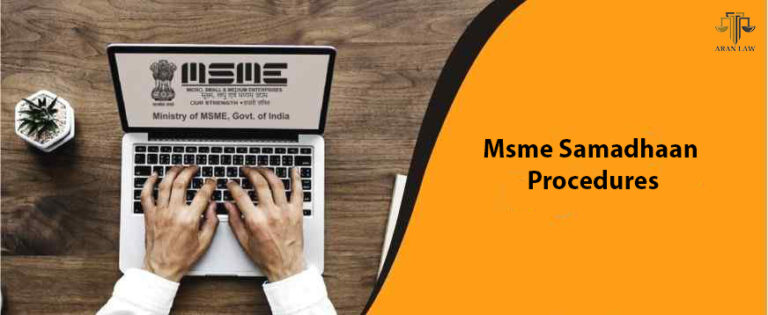In the world of business, Micro, Small, and Medium Enterprises (MSMEs) play a vital role in driving economic growth and employment opportunities. However, MSMEs often face challenges related to delayed payments from buyers or clients. To address these concerns, the Government of India introduced the MSME Samadhaan initiative. This article aims to shed light on the common errors that can occur during MSME Samadhaan procedures and how to avoid them.
Understanding MSME Samadhaan
MSME Samadhaan is a mechanism introduced by the Government of India to facilitate the resolution of delayed payment disputes for MSMEs. It provides a platform for MSMEs to file applications and seek redressal for delayed payments from buyers, both within the government and private sector.
Importance of MSME Samadhaan Cases
MSME Samadhaan cases hold significant importance for MSMEs as they provide a legal framework to address delayed payment issues. By filing a case under MSME Samadhaan, MSMEs can ensure timely receipt of payments, maintain cash flow, and protect their business interests. It offers a streamlined approach to resolve disputes without resorting to lengthy and expensive legal proceedings.
Common Errors in MSME Samadhaan Proceedings
Incomplete Documentation
One of the common errors in MSME Samadhaan procedures is the submission of incomplete documentation. It is essential to carefully review and provide all the required documents to support your case. Failure to do so may result in the rejection or delay of your application.
Lack of Proper Legal Assistance
Many MSMEs make the mistake of not seeking proper legal assistance during the MSME Samadhaan proceedings. Engaging an experienced MSME Samadhaan lawyer can greatly enhance your chances of a favorable outcome. A lawyer can guide you through the process, help prepare a strong case, and represent your interests effectively.
Delay in Filing Applications
Timeliness is crucial when it comes to MSME Samadhaan cases. Delaying the filing of applications can hamper your chances of recovering the delayed payments. It is important to be proactive and initiate the proceedings as soon as the payment becomes overdue.
Ignoring Relevant Regulations and Guidelines
MSME Samadhaan procedures have specific regulations and guidelines that need to be followed. Ignoring or overlooking these regulations can lead to errors in the application process. It is crucial to familiarize yourself with the requirements and adhere to them diligently.
Failure to Follow Up and Track Progress
After filing an application under MSME Samadhaan, it is essential to actively follow up and track the progress of your case. Failure to do so can result in delays or missed opportunities for resolution. Regularly communicate with the concerned authorities and gather updates on the status of your application.
The Role of MSME Samadhaan Lawyers
MSME Samadhaan lawyers play a crucial role in ensuring a smooth and successful resolution of delayed payment disputes. They possess in-depth knowledge of the relevant laws and regulations and can provide expert guidance throughout the proceedings. These lawyers can assist in document preparation, negotiation, representation in hearings, and other legal aspects of the case.
How to Avoid Common Errors in MSME Samadhaan Procedures?
To avoid common errors in MSME Samadhaan procedures, consider the following:
- Thoroughly review and prepare all necessary documentation before submitting the application.
- Seek professional legal assistance from an experienced MSME Samadhaan lawyer.
- File the application promptly, without delay, once the payment becomes overdue.
- Familiarize yourself with the regulations and guidelines governing MSME Samadhaan and ensure compliance.
Actively follow up and track the progress of your case, maintaining effective communication with the relevant authorities.
Frequently Asked Questions (FAQs)
1. What is the time limit for filing an application under MSME Samadhaan?
Under MSME Samadhaan, the application should be filed within a period of 90 days from the date of acceptance or deemed acceptance of the goods or services.
2. Can I handle MSME Samadhaan proceedings without a lawyer?
While it is possible to handle MSME Samadhaan proceedings without a lawyer, seeking legal assistance is highly recommended. A lawyer can provide valuable expertise, improve the chances of a favorable outcome, and guide you through the complex legal procedures.
3. What happens if the MSME Samadhaan application is rejected?
If the MSME Samadhaan application is rejected, you have the option to file an appeal within 30 days from the date of receipt of the rejection order. It is advisable to consult with a lawyer to understand the appropriate course of action in such cases.
4. Is it possible to appeal a decision made under MSME Samadhaan?
Yes, it is possible to appeal a decision made under MSME Samadhaan. If you are dissatisfied with the outcome, you can file an appeal within 30 days from the date of the order. It is crucial to seek legal guidance to ensure compliance with the appeal process.
5. Are there any alternatives to MSME Samadhaan for resolving disputes?
Yes, apart from MSME Samadhaan, alternative dispute resolution methods such as mediation and arbitration can be explored to resolve disputes. These methods provide a more informal and expedited approach to reach a resolution.
Conclusion
Effective management of MSME Samadhaan procedures is crucial for MSMEs to address delayed payment issues and protect their business interests. By understanding and avoiding common errors, such as incomplete documentation, lack of legal assistance, delays in filing applications, disregarding regulations, and inadequate follow-up, MSMEs can enhance their chances of successful resolution. Engaging the expertise of MSME Samadhaan lawyers can further improve the outcome of the proceedings. Timely action, compliance, and active participation are key to navigating MSME Samadhaan procedures smoothly and securing the rightful payments for MSMEs.

